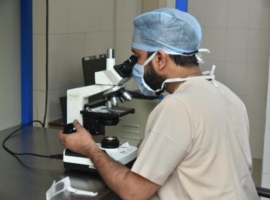What to Expect in a Diagnostic Tests for Recurrent Pregnancy Loss
Overview of Recurrent pregnancy loss diagnosis
Navigating the recurrent pregnancy loss diagnosis is like piecing together a complex puzzle. It involves a series of steps designed to understand the underlying causes of repeated pregnancy losses. The journey begins with a comprehensive overview where healthcare professionals gather information about your medical history, lifestyle, and previous pregnancy experiences. In this blog post, we’ll walk through the process, from assessing recurrent pregnancy loss causes to fertility testing after recurrent miscarriage, and understanding what to expect during pregnancy loss tests.
When to Consider Diagnostic tests for pregnancy loss
Deciding when to undergo diagnostic tests for Pregnancy Loss is a pivotal moment in the journey towards building a healthy family. It’s typically recommended after experiencing two or more consecutive pregnancy losses. This threshold is set to investigate potential underlying issues that may be contributing to the recurrent losses.
The Definition of Recurrent Pregnancy Loss
To understand and assess recurrent pregnancy loss causes, first one must grasp its definition. Recurrent Pregnancy Loss is characterized by the unfortunate occurrence of two or more consecutive pregnancy losses before the 20th week of gestation. Each loss is a heartbreaking event, and when they happen in succession, it prompts a closer look at potential underlying causes. Healthcare providers consider various factors, including maternal age, health history, lifestyle, and potential genetic factors, when assessing the definition of Recurrent Pregnancy Loss. This comprehensive evaluation for recurrent pregnancy loss sets the stage for targeted diagnostic tests aimed at identifying and addressing the root causes.
Seeking Testing After Multiple Pregnancy Losses
Experiencing multiple pregnancy losses can be emotionally and physically draining. It’s at this juncture that seeking diagnostic tests becomes not just a medical recommendation but a crucial step in the journey towards parenthood. After enduring the pain of multiple losses, it’s natural to seek answers and solutions. Healthcare providers recommend testing after multiple pregnancy losses to unravel the mystery behind the recurrent setbacks. These tests go beyond routine examinations, delving into genetic, hormonal, and structural aspects that may be contributing to the challenges you’ve faced.
Preparing for Diagnostic Tests
Before embarking on diagnostic tests for pregnancy loss, it’s important to be well-prepared for what lies ahead. This preparation involves not just the physical aspects but also understanding the emotional toll it may take.
Medical History and Background
Your medical history is like a roadmap for your healthcare provider as we – the best IVF center in Mumbai at Dr L H Hiranandani Hospital. It helps them understand your health journey, identify potential risk factors, and tailor diagnostic tests accordingly. Be ready to discuss any pre-existing conditions, past surgeries, medications, and, importantly, your reproductive history. Details about previous pregnancies, the circumstances surrounding the losses, and outcomes can provide vital clues.
Physical Examinations
Expect a thorough physical examination as part of the preparation process. Your healthcare provider will assess your overall health and focus on reproductive organs. For women, this may include a pelvic exam to check for abnormalities in the uterus, cervix, or ovaries. Men might undergo a semen analysis to evaluate sperm health. These examinations help build a comprehensive picture of your reproductive health and guide further testing decisions.
Counseling and Emotional Support
Preparing for diagnostic tests isn’t just about the physical aspects; it also involves emotional readiness. Experiencing recurrent pregnancy loss can be emotionally taxing. Counseling provides a safe space to discuss fears, anxieties, and uncertainties. Emotional support is a crucial component of preparation, helping you navigate the emotional rollercoaster that often accompanies fertility struggles. Whether through individual counseling or support groups, addressing the emotional aspect is as important as the physical.
Seeking emotional support is not a sign of weakness; it’s a proactive step towards holistic well-being. Recognizing the emotional toll and taking steps to address it can positively impact your overall readiness for the diagnostic procedures for pregnancy loss.
Common Diagnostic Tests
Once you’re prepared, your healthcare provider may recommend a series of common diagnostic tests for recurrent miscarriage to gather valuable information about your reproductive health.
Chromosomal Testing
Chromosomal abnormalities can be a contributing factor in recurrent pregnancy loss. Chromosomal testing, often done through blood work, examines your and your partner’s chromosomes for any irregularities. Understanding these genetic factors can guide treatment options and family planning decisions.
Hormonal Assessments
Hormonal imbalances can disrupt the delicate balance required for a successful pregnancy. Hormonal assessments involve blood tests to evaluate levels of reproductive hormones such as progesterone, estrogen, and thyroid hormones. Identifying and addressing hormonal issues can improve the chances of a healthy pregnancy.
Imaging Studies
Imaging studies, such as ultrasounds, provide a visual inspection of the reproductive organs. These studies help identify structural abnormalities, such as fibroids or polyps, which may impact fertility. The insights gained from imaging studies assist in developing a targeted plan for treatment or intervention.
Uterine Evaluation
A comprehensive evaluation of the uterus is crucial. This may involve imaging studies, as well as more specialized tests like a hysterosalpingogram (HSG) or sonohysterography. These tests can reveal abnormalities in the uterine cavity, such as adhesions or abnormalities in the shape of the uterus, which may affect pregnancy.
Specialized Tests and Procedures
In some cases, your healthcare provider may recommend more specialized tests and procedures to delve deeper into potential causes of recurrent pregnancy loss.
Blood Clotting Disorders Testing
Blood clotting disorders can impact blood flow to the uterus, affecting pregnancy viability. Specialized tests assess clotting factors and identify any abnormalities. Treatment options may include blood thinners to improve blood circulation and support a healthy pregnancy.
Immune System Assessments
An overactive immune response can sometimes contribute to recurrent pregnancy loss. Immune system assessments involve evaluating immune markers to determine if there is an immune-related factor affecting fertility. Understanding the immune system’s role helps tailor treatment plans for a successful pregnancy.
Genetic Testing
Genetic testing goes beyond chromosomal testing and explores specific genes associated with reproductive health. This can provide insights into inherited conditions that may impact fertility. Understanding genetic factors allows for informed decision-making about family planning and potential interventions.
Understanding the Results
Once the diagnostic tests are complete, the next step is understanding the results. This phase involves open and honest communication with your healthcare provider.
Discussing Results with Your Healthcare Provider
Schedule a thorough discussion with your healthcare provider to review the test results. This conversation is an opportunity to ask questions, seek clarification, and understand the implications of the findings. Your healthcare provider will guide you through the results, explaining any identified issues and potential treatment options.
Coping with Results
Coping with the results, whether positive or negative, is a crucial part of the journey. It’s normal to experience a range of emotions, from relief to disappointment or even grief.
During this time, it’s essential to maintain open communication with your healthcare provider and seek additional emotional support if needed. Understanding the results is the first step towards developing a tailored plan for future pregnancies. Remember that each individual’s journey is unique, and there are various paths to explore.
Explore foods for reproductive health in our blog post: Foods That Support Reproductive Health
Preparing for and undergoing diagnostic tests for pregnancy loss is a comprehensive process that involves physical and emotional readiness. The insights gained from these tests empower you and IVF doctors to make informed decisions, increasing the likelihood of a healthy and successful pregnancy in the future. Stay resilient, stay informed, and know that support is available every step of the way.





There are no comments